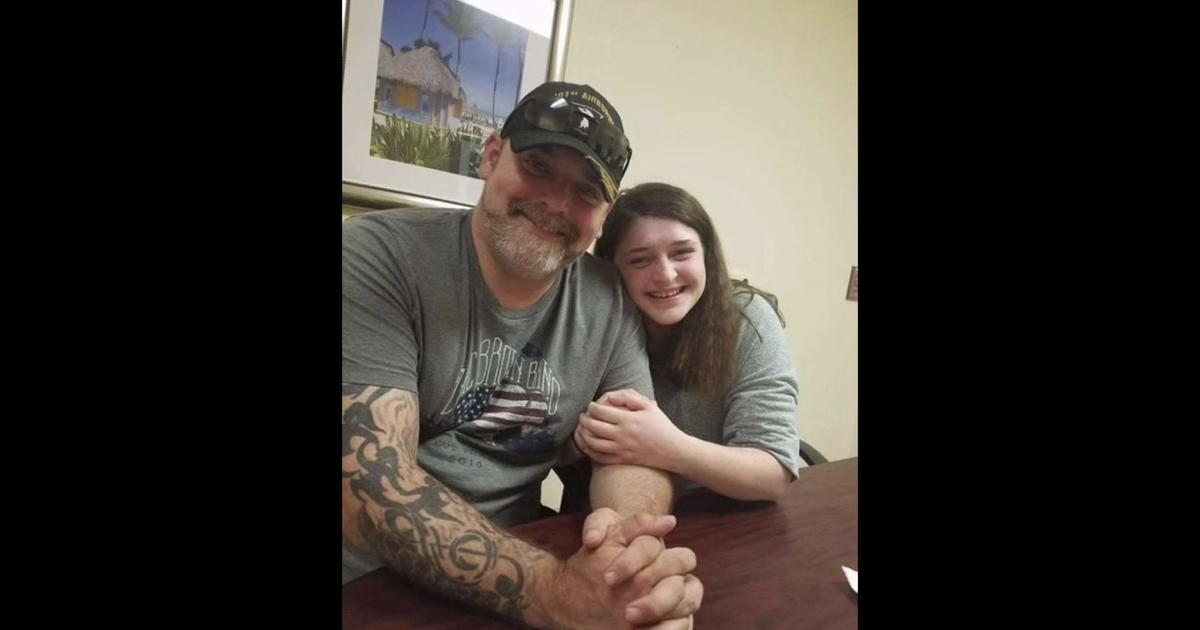I Team: Dog Days at the Track
Dan Adkins strolls along the grandstands of Mardi Gras Dog Track and remembers the way things used to be.
"When this was built in '74, it was the largest grandstand in the world for greyhound racing," says Adkins, the president of Mardi Gras, formerly Hollywood Greyhound Race Track. "Still is today. In 1981 we had 14,000 people here. We used to have 10,000 to 12,000 people regularly here on weekends in the early Eighties."
When CBS4 I Team investigator Jim DeFede, noted that it has been a long time since Adkins had 14,000 people in those grandstands, Adkins replied: "It's been a longtime since we had 400 people in these grandstands. I think on a good Saturday night we might have 100 people sitting out here watching the races"
Adkins says he is going to lose $2.5 million this year on the dog races. Down the road in Miami, the owners of Flagler Dog Track are reportedly losing almost $2 million a year.
Adkins said the sad reality is that the dog racing industry can not be revived.
"It's dead," he declared. "I've been in this business my entire life and its dead."
So why continue to operate a business that is losing millions of dollars a year? Well you don't have to walk far to find the answer to that question. Just behind that massive and empty grandstand lies a casino with more than 1,200 slot machines and a card room for high stakes poker.
"This is the kind of entertainment gaming activity that people are looking for," Adkins said as he walked through the casino floor.
But in order to operate the casino Adkins has to keep racing dogs.
"The law is forcing me to put greyhounds on this track every day and run," he said.
But before you feel sorry for Adkins, you should realize it's a law he helped create. A decade ago, Adkins realized there was no long-term future in dog racing. But rather than close as other tracks around the country have done, he held on to racing, using the track's economic problems as leverage to get voter approval five years ago to install slot machines. Now that he has his casino, he's looking to dump the dog track.
"If you could replace this greyhound track with a resort destination casino on this same property, the same property where gambling has been taking place for 80 years, now you are going to create jobs, you are going to create billions of dollars for this state in revenue," Adkins said.
Adkins along with the owners of Flagler Dog Track, are pushing for legislation in Tallahassee that would allow them to keep their casinos while closing their racing facilities.
In addition, they would like to see the Legislature allow them to expand their casino operations to include all of the games they are currently prohibited from operating – including blackjack, roulette and craps.
"The track operators for some years now have wanted to become casino operators, but they don't want to be honest with the people of Florida and say they want to open a casino, so they have backdoored the casinos through card rooms and parimutuel wagering," said Jack Cory, a lobbyist for the Florida Greyhound Association, which represents the dog owners and trainers.
Cory said the track owners tried to sneak a bill through the legislature last year but were unsuccessful. He said he has already heard they are working to do the same again this year.
Cory said if folks like Adkins and the Havenick family, which owns Flagler Dog Track, don't think they can make a profit racing dogs then they should turn in their licenses and allow someone else to operate the dog tracks. Cory argues it is not fair to allow the current owners to summarily decide greyhound racing is a dead business.
Unfortunately, many of the dog men, as they are called, have no idea what the track owners are doing. James "Barney" O'Donnell, 81, has been racing dogs for more than 50 years and currently owns between 300 and 400 greyhounds.
Even when he was told of Adkins plans, O'Donnell refused to believe it. O'Donnell said he believes Adkins is going to work to save the track.
"He's going to improve it," O'Donnell said. "He's going to improve it."
But in fact, he says he's not. And while turning his back on the dog men, Adkins and the track owners are forging some unusual alliances with groups such as Grey2K, an animal rights group that has waged a relentless ten year battle with the racing industry.
"It's a little bit like Alice in Wonderland," said Carey Theil, the group's executive director.
In 2008, Grey2K helped win approval for measures banning dog racing in Massachusetts and New Hampshire. They have also watched as tracks have closed in Connecticut, Kansas and Wisconsin.
There are only 23 dog tracks left in the United States -- with thirteen of them here in Florida.
If Adkins looks at the issue strictly as a matter of dollars and cents, Theil approaches it with a sense of outrage. Greyhound racing, he argues, is inherently cruel and inhumane to the animals, which spend 20 to 22 hours a day locked in cages, stacked on top of one another in long, windowless kennels.
"A lot of people think these dogs are owned by people and they are taken to the track and they race and they go home at night," Theil said. "That's not the case. These tracks require a large population of dogs and because of that they use a housing system that is cruel and inhumane."
Theil took CBS4 News to the Florida Kennel compound in Hialeah. The facility, which can house hundreds, if not thousands, of dogs, is jointly owned by Mardi Gras and Flagler dog tracks. Theil described how dogs are typically housed.
"They are in their cages up to 22 hours a day on average," he explained. "Perhaps the dogs are let out of their cages four times a day to relieve themselves for thirty minutes and the rest of their life is spent in a cage. If most Floridians could go through this guard shack and past the barbed wire fence and see for themselves how dogs live in this kennel compound I believe they would say this is something that must come to an end."
Theil provided us a copy of an undercover investigation his group did surrounding the conditions of the kennel in Tucson Arizona highlighting, he says, the way dogs are routinely confined. The video shows dogs muzzled in their cages.
"No dog would like to live in a cage, but the fact that greyhounds love to run and are so gifted makes it especially cruel that these dogs endure a life of confinement," Theil said. "It's just no way to treat a dog."
And then there is the case of Ronnie Williams. A kennel operator and trainer at Ebro Dog Track in the Florida Panhandle. In October, state investigators discovered more than 30 dogs starved to death inside his kennel.
"When you first drove up outside the gate, way out in the parking lot, you could smell the stench of the dead animals," said Washington County Sheriff Bobby Haddock.
Williams is facing more than 30 felony counts of animal cruelty and remains in the Washington County jail.
"What we are trying to find out is when is the last time the kennels were inspected?" Haddock said recently. "Who went in the kennels? Who knew what? And what the checks and balances are?"
Unfortunately, according to Theil, there really aren't any checks and balances. Until recently inspectors from the state had to call in advance and set up an appointment before they could inspect the kennels. And even when inspections do occur, the reports are troubling.
CBS4 News obtained copies of reports from the state division of pari-mutuel wagering regarding inspections they have done on kennels across the state. Of the 127 inspections conducted 20 percent - or one in five - listed the condition of the kennel as poor or worse. There were 28 instances of multiple dogs living in the same cage and 724 instances of greyhounds being injured.
Which brought our interest back to Florida Kennels. CBS4 News wanted to see for ourselves what conditions were like inside the Hialeah compound.
Initially, Adkins agreed to show us.
"Yeah, sure, I'll take you down there myself," he said.
But the next day we were told the dog owners and trainers did not want to let us in with our cameras. Theil said it is not only the issue of confinement that makes the sport inhumane. Dogs are routinely injured and killed while racing.
Grey2K has amassed a library of video in which dogs are hurt and killed, including a case where a greyhound was electrocuted at a track in Orlando when he tripped and fell into an electric rail.
They also provided CBS4 News video of a terrible accident at Mardi Gras in which a dog – BB's Story Book – collided with other dogs while trying to make the first turn, became disoriented and ran in the wrong direction. As the announcer shouted for handlers to get the dog off the track, it crashed into lure carrying the metal rabbit that the dogs chase. The dog is believed to have died instantly.
"As long as you have commercial dog racing you are going to have dogs that die on the track," Theil said.
How many dogs are killed or injured every year at Florida greyhound tracks? Unfortunately, no one has the answer. Florida track owners are not required to maintain those types of records. In fact, every time legalization has been proposed that would require them to keep such records they have vehemently opposed it.
"It is a sport, it's a contact sport, it's like football or baseball and injuries do happen." Adkins admitted. "But these dogs are very well taken care of. I will never call this an inhumane sport because nobody in this industry does anything to hurt these animals "
But ironically, because of the groundwork of Grey2K, and the growing public perception that dog racing is in fact cruel, that may allow Adkins to keep his casino while losing the dog track.
"For me it's not a humane issue, it's an economic issue," Adkins said. "It's that simple. If this sport was making money, again being brutally honest about it, I would do everything I could to continue it because I don't view it as an inhumane sport. I do view it as a money loser."
Theil said Adkins motivations are irrelevant to him. If he can forge an alliance with the track owners to close their tracks he is more than willing to do it.
"Regardless of what the reason is, I think its time to give the dogs a break." Theil said. "These dogs have suffered and died at these race tracks for generations and this is no longer a viable industry, no one is interested in it, it is time for this to end."



